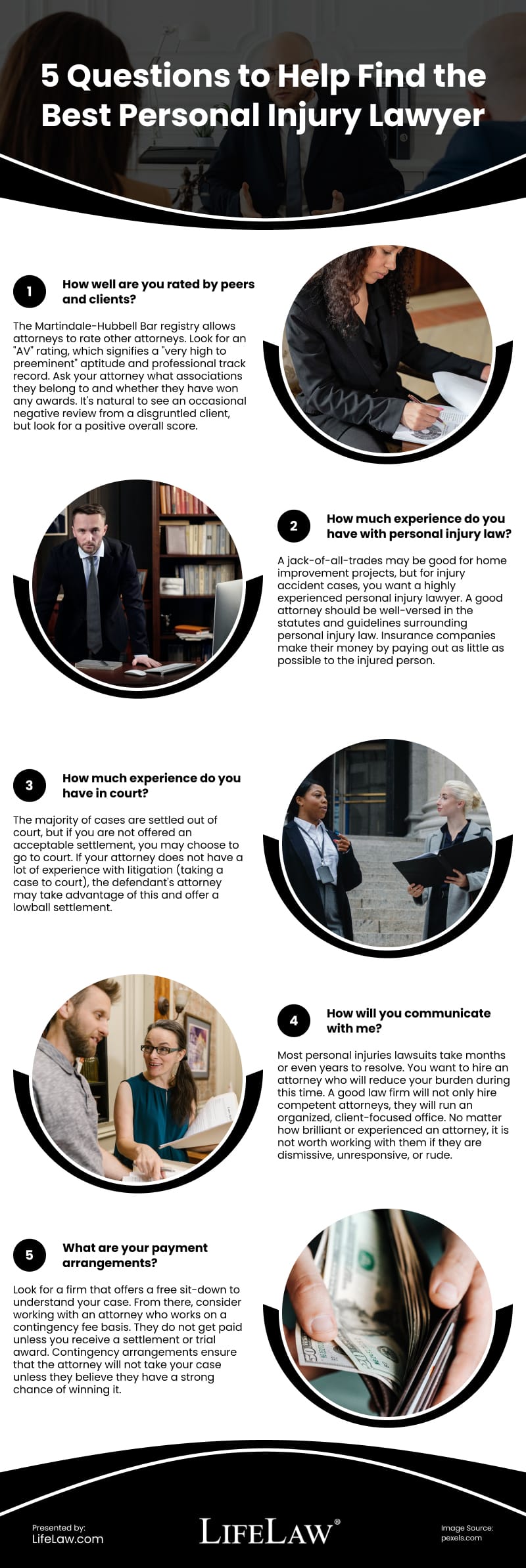Injury accidents can completely upend your life–affecting your health, your ability to work, and even your relationships. The decision to file a personal injury lawsuit can help you get the compensation you’re entitled to and regain control of your life, but you need to make sure you are in the best hands.
A bad personal injury attorney can make your legal journey stressful and frustrating and jeopardize your case. A good attorney can shoulder the stresses of the case for you and leverage their expertise to help you get the full compensation that you deserve. But understanding that you need a good personal injury attorney and finding one are two different things.
There are a lot of Utah personal injury lawyers out there, so how do you vet them for quality–especially when they are all claiming to be the best in their field? You can start by asking the right questions.
How well are you rated by peers and clients?
The Martindale-Hubbell Bar registry allows attorneys to rate other attorneys. It is widely considered the most respected review platform for the legal community. Look for an “AV” rating, which signifies a “very high to preeminent” aptitude and professional track record.
You can also ask your attorney what associations they belong to and whether they have won any awards, either in law school or as practicing attorneys.
To find out what clients think of a personal injury lawyer, check out their online reviews. Just as doctors have review sites like Zocdocs and Healthgrades, attorneys have their own rating platforms, including Avvo.com and Lawyers.com. It’s natural to see an occasional negative review from a disgruntled client but look for a positive overall score. Another good sign is if the firm has taken the time to tactfully and constructively address the negative reviews online.
How much experience do you have with personal injury law?
A jack-of-all-trades may be good for home improvement projects, but for injury accident cases, you want a highly experienced personal injury lawyer. The statutes and guidelines surrounding personal injury law can be particularly complex. A good attorney should be well-versed in these to help you file all paperwork correctly and on time. This can keep your case from dragging on.
They should be deeply familiar with the laws. Without this knowledge, an attorney may miss an opportunity to leverage a certain law in your favor. They should also have extensive experience in dealing with insurance companies. Insurance companies make their money by paying out as little as possible to the injured person. They have a full arsenal of tools to try to get out of paying: claiming that your injuries are a result of pre-existing conditions instead of the accident, claiming that you are exaggerating your injuries, etc. A good personal injury attorney should be like a skilled chess player, anticipating the insurance company’s next move and knowing exactly how to counter it for maximum compensation.
And finally, a big part of a case is estimating damages. Let’s say you sustained a traumatic brain injury that continues to plague you with ongoing, severe headaches. At the very least, your award should cover your medical care and missed work, but how do you know exactly how much that will add up to over time? A seasoned injury attorney will have handled enough similar cases to estimate damages for now—and for the unseen future.
How much experience do you have in court?
The majority of cases are settled out of court, but if you are not offered an acceptable settlement, you may choose to go to court. If your attorney does not have a lot of experience with litigation (taking a case to court), the defendant’s attorney may take advantage of this. They may offer a lowball settlement, knowing that your attorney may press you to settle rather than go to court.
How will you communicate with me?
Most personal injury lawsuits take months or even years to resolve. You want to hire an attorney who will reduce your burden during this time–not add to it. No matter how brilliant or experienced an attorney is, it is not worth working with them if they are dismissive, unresponsive, or rude.
A good law firm will not only hire competent attorneys, they will run an organized, client-focused office. You should be treated courteously, and your questions and concerns should be addressed promptly. If a firm cannot ensure responses within 24 hours (or close to it), you may want to keep looking. A personal injury is stressful enough without feeling like you are pulling teeth to get a response from your attorney.
What are your payment arrangements?
Where the initial consultation is concerned, look for a firm that offers a free sit-down to understand your case. From there, consider working with an attorney who works on a contingency fee basis. This means that they do not get paid unless they receive a settlement or trial award. They will then take their fees from your award.
Contingency arrangements ensure a couple of things. First, they make sure that the attorney will not take your case unless they believe they have a strong chance of winning it. Second, it removes the risk from the case because you won’t be out a penny if you don’t receive an award.
An injury accident is difficult enough; your legal journey shouldn’t be. Contact our Salt Lake City personal injury lawyers to schedule a consultation and learn how we measure up against other injury attorneys in our area.
Infographic
This infographic provides key vetting questions to identify the best personal injury lawyer and get maximum compensation after an accident. It explains how to thoroughly evaluate attorneys through reviews, expertise, communication practices, and fee arrangements to secure an assertive yet compassionate advocate who will lighten your burden and devote themselves to your case’s success.

